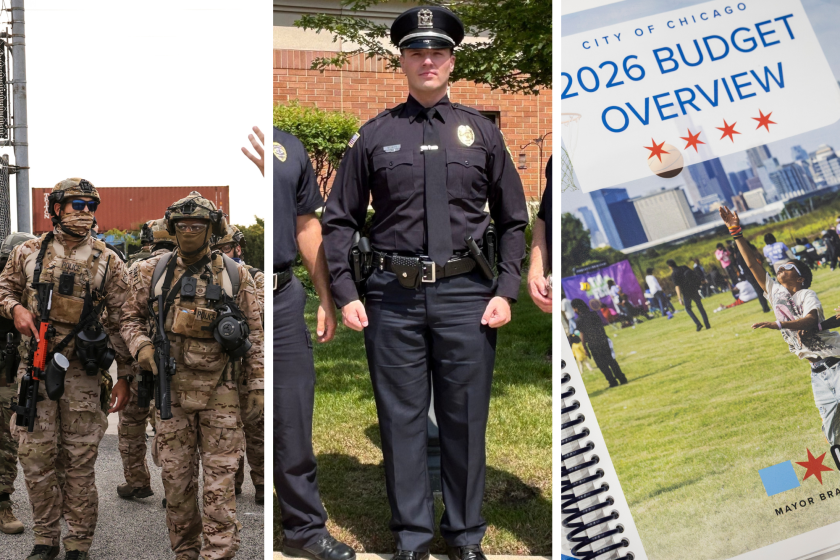Top Stories
Federal Court Blocks Trump’s National Guard Deployment in Illinois

UPDATE: A federal appeals court has just upheld a crucial block on President Donald Trump’s efforts to deploy the National Guard in Illinois. This unanimous decision from the 7th U.S. Circuit Court of Appeals confirms that the President’s actions lack legal justification, a significant ruling that could influence future federal interventions.
This urgent development emerged on Thursday, as the three-judge panel found no errors in U.S. District Judge April Perry’s ruling from October 9, which prevents the deployment of troops. The court stated, “the facts do not justify the president’s actions in Illinois” under the cited legal framework, emphasizing that “political opposition is not rebellion.”
The ruling is particularly poignant against the backdrop of the Trump administration’s claims of success in enforcing immigration laws in the Chicago area. The panel noted that the administration’s own rhetoric undermines any argument for deployment, stating, “The administration has been proclaiming the success of its current efforts.”
As a result, the deployment of National Guard troops remains blocked in Illinois. However, legal experts suggest that this ruling could prompt an appeal to the U.S. Supreme Court, potentially escalating tensions between state and federal authorities.
In related news, Illinois Attorney General Kwame Raoul has highlighted the divide in law enforcement and government perspectives on ICE enforcement in the Chicago area. This ongoing conflict underscores the complexities surrounding immigration policy and local governance.
Amid these developments, a recent decision by U.S. District Judge Sara Ellis has also raised eyebrows. Judge Ellis prohibited agents from using gas and other “riot control” weapons in Chicago without prior warning during Trump’s deportation efforts, expressing serious concerns over compliance with her orders.
This ruling comes at a pivotal moment for the city, as Mayor Brandon Johnson plans to unveil a budget that includes a proposed tax on social media companies, aiming to address a significant budget shortfall. Johnson’s administration is pushing for progressive taxation to generate revenue for Chicago Public Schools and other essential services.
As these legal and political battles unfold, the implications for law enforcement practices, community safety, and federal-state relations are profound. Many residents are closely watching how these decisions will impact their communities, especially as protests against federal policies are planned across the region.
Stay tuned for further updates on this developing story, as it continues to shape the landscape of governance and law enforcement in Illinois.
-

 Science2 months ago
Science2 months agoInventor Achieves Breakthrough with 2 Billion FPS Laser Video
-

 Health2 months ago
Health2 months agoCommunity Unites for 7th Annual Into the Light Walk for Mental Health
-

 Top Stories2 months ago
Top Stories2 months agoCharlie Sheen’s New Romance: ‘Glowing’ with Younger Partner
-

 Entertainment2 months ago
Entertainment2 months agoDua Lipa Aces GCSE Spanish, Sparks Super Bowl Buzz with Fans
-

 Health2 months ago
Health2 months agoCurium Group, PeptiDream, and PDRadiopharma Launch Key Cancer Trial
-

 Top Stories2 months ago
Top Stories2 months agoFormer Mozilla CMO Launches AI-Driven Cannabis Cocktail Brand Fast
-

 Entertainment2 months ago
Entertainment2 months agoMother Fights to Reunite with Children After Kidnapping in New Drama
-

 World2 months ago
World2 months agoIsrael Reopens Rafah Crossing After Hostage Remains Returned
-

 Business2 months ago
Business2 months agoTyler Technologies Set to Reveal Q3 Earnings on October 22
-

 World2 months ago
World2 months agoR&B Icon D’Angelo Dies at 51, Leaving Lasting Legacy
-

 Health2 months ago
Health2 months agoNorth Carolina’s Biotech Boom: Billions in New Investments
-

 Health2 months ago
Health2 months agoYouTube Launches New Mental Health Tools for Teen Users









